

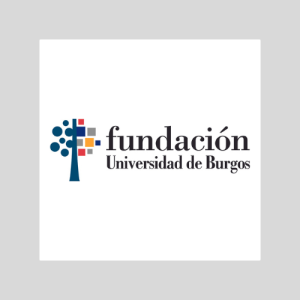
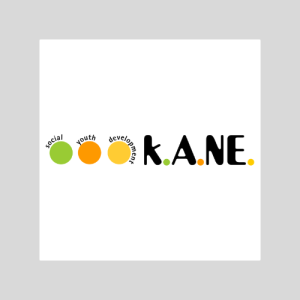
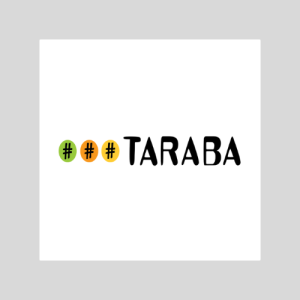
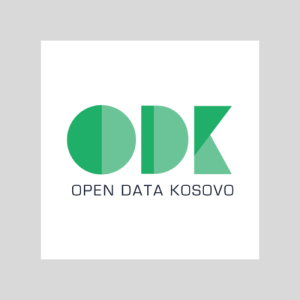
The hardest part of starting up is starting out.
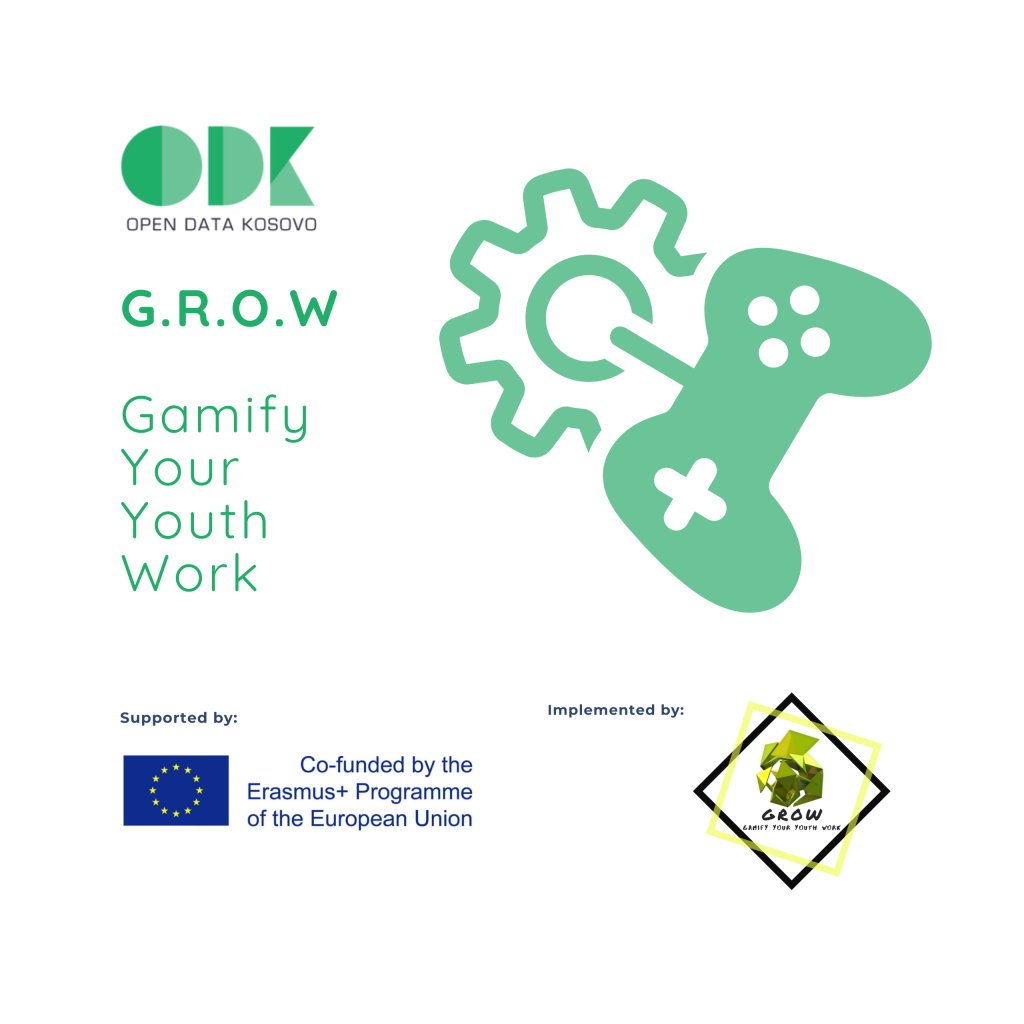







Financed by GIZ Kosovo, this project will be implemented within the period of 8 months, from 1 July 2021 to 28 February 2022. The project aims to promote the scheme results of the Municipal Performance Grant Clean Environment (MPG-CE): which is a project in itself being implemented by GIZ Kosovo and the Ministry of Environment, Spatial Planning and Infrastructure from 2018. The aim of the MPG-CE is to promote a better municipal performance in the provision of services to citizens, which awards and allocates funds from national investments through performance-based competition between the local municipalities in Kosovo. ODK in collaboration with GIZ Kosovo will deliver the planned activities regarding this project as visual presentations of the schemes results achieved within the MPG-CE. The main goal of promoting the key outcomes of the MPG-CE throughout this project is to inform and engage the wider audience, i.e. the citizens of the local municipalities regarding the MPG-CE as an important mechanism.
Implementation year: 2018 – 2019


The Emergency Procurement Monitoring & Research Kosovo is a project funded by the Open Contracting Partnership and implemented by Open Data Kosovo aiming to monitor all public contracts signed during the Covid-19 pandemic, and raise awareness regarding the red flags identified during this process. The objective of this contract is to implement planned activities in order to achieve measurable improvements in accountability and integrity in COVID19-related procurement and to strengthen the capacity of national systems to provide equitable access to healthcare during the COVID19 pandemic and future crises. In total 320 contracts have been monitored, analyzed, and shared with the Open Contracting Partnership team, who then have visualized the data in the following link: https://www.open-contracting.health/country/kosovo/data. A report will be published as part of this project which will showcase the findings and provide recommendations.
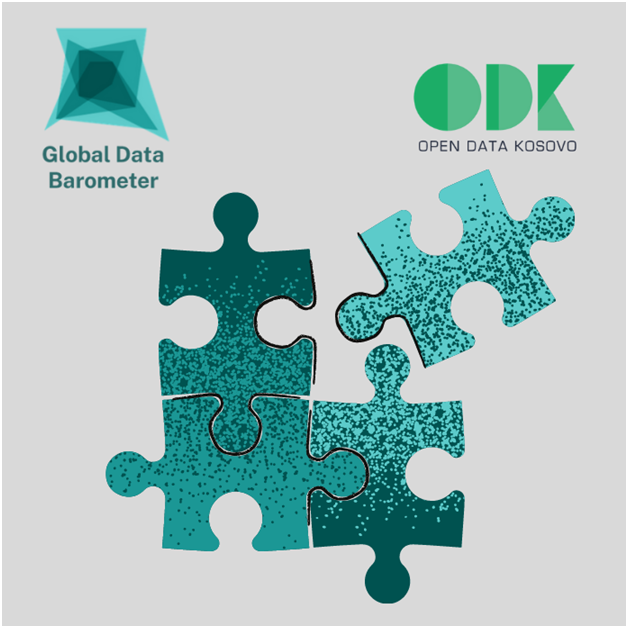
ODK has joined the Global Data Barometer project and the Global Community of Regional Hubs in Fall 2020. ODK acts as a Regional Hub for the Global Data Barometer project for Kosovo and Albania.
GDB is a multi-stakeholder initiative and it works with Regional Hubs, thematic partners, governments, private sector and civil society organizations, academia, and the media, to fill data gaps, generate insights, and support debate about our data futures. It will produce a benchmark study based on a common methodology to support cross-country comparison and learning regarding laws and policies, data availability, data capabilities, and data use across a range of settings. And it will provide rich primary data to the fuel sector and issue-specific data-related initiatives.
The GDB project received sixteen applications, which were evaluated on several criteria: geographical balance; capacity for in-kind contribution during GDB’s design phase; experience in implementing data-related projects, policies, or regional initiatives; fundraising capacity; and the network and resources for convening various stakeholders during the dissemination phase.
Today, ODK is excited to be part of this Global Community of GDB Regional hubs.
In 2021, ODK Hub will continue supporting the Global Data Barometer project through engaging in the study design process, data collection, analysis and dissemination of the results. The expert survey will generate data on 100+ countries, leading to a new research-ready open dataset, in-depth analysis, and country and sectoral profiles.
ODK regional Hub Coordinator is Dafina Olluri, Deputy Director at ODK.
Open Data Kosovo is a nonprofit organization that believes in using civic-tech and digital humanitarianism to open government. ODK recognizes and believes in the power of technology to deliver ground-breaking citize action solutions and disclose public data to establish effective, transparent and accountable governance. All local projects undertaken by ODK involve rendering government processes more transparent by opening government data in ways that sheds light on the internal workings of government activities (e.g. opening procurement data to better monitor procurement practices).
The regional hubs, including Open Data Kosovo, will be responsible for:
For more details about the Global Data Barometer (GDB), please visit the website: www.globaldatabarometer.org
NOTE: The pilot edition of the Global Data Barometer receives funding from United National Development Programme (UNDP in Kosovo).
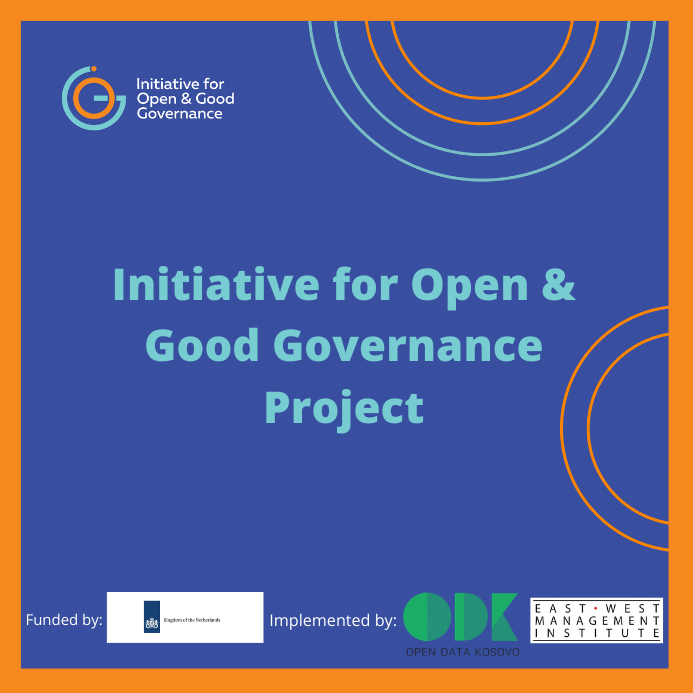
Financed by the Matra Programme 2020 as part of the Kingdom of the Netherlands in Kosovo.
The project aims to start the initiative of the membership of Kosovo in the Open Government Partnership. The Open Government Partnership (OGP) is a multilateral non-political initiative that aims to secure concrete commitments from national and subnational governments to promote open government, empower citizens, fight corruption, and harness new technologies to strengthen governance.
The overall objective of the project is increasing the level of openness and good governance of Kosovo institution by upholding the principles of good governance via
Open Government Partnership.
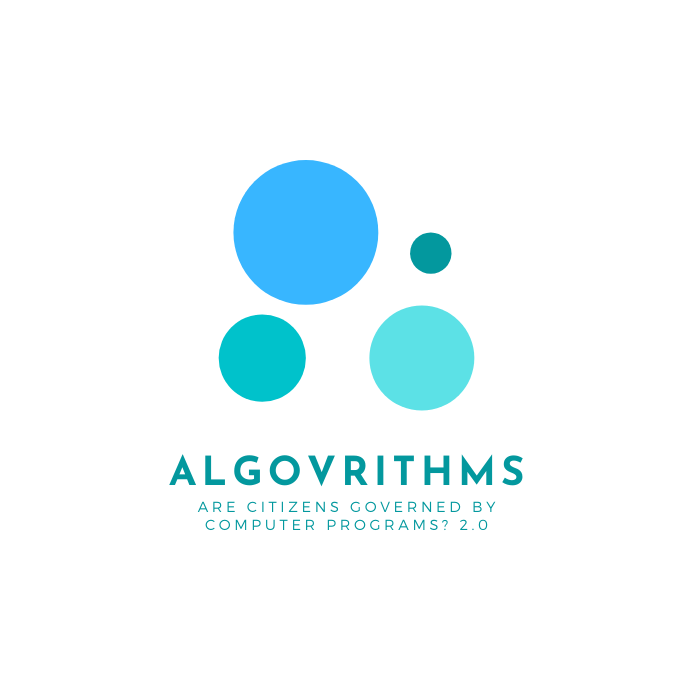
AlGOVrithms; Are citizens governed by computer programs? 2.0 is a project focusing on the area of public policy, legislation and justice. This project will create common advocacy strategies addressing regional issues. The use of algorithms within governments around the world has been increasing continuously. Nevertheless, such movement towards Automated Decision-Making (ADM) has been accompanied with great flaws. Whether that is predictive policing software that targets unfairly citizens from minority communities in the Chicago, US as is reported in In Detail, or a ‘streaming tool’ used by UK to assess the risks of foreign individuals applying for visa as reported by Independent Chief Inspector of Boards and Immigration in the UK, the process has gone unmonitored and unregulated. Thus, risking the fair and accurate treatment of citizens. In addition, the previous research conducted during the alGOVrithms project led by ePaństwo Foundation in the V4 countries found that in the area of automated decision-making, there is a lack of consistent policies accompanied with lack of transparency of ADM used, lack of monitoring and auditing ADM, and finally, with lack of potential legal remedies and compensation. Consequently, the usage of ADM within the target countries of the proposed project is highly-needed. Thus, the proposed project will build upon the previous research conducted during the alGOVrithm project, extend it to new countries with a focus on the topic of public procurement. Specifically, how the process of procuring ADM can bring more transparency, and control over the use of such tools will be researched and analyzed. Hence, such research represents a informed-approach to driving a debate within CSOs, academia, policymakers, and citizens through press conferences, workshops, recommendations amongst others.
The project is co-financed by the Governments of Czechia, Hungary, Poland and Slovakia through Visegrad Grants from International Visegrad Fund. The mission of the fund is to advance ideas for sustainable regional cooperation in Central Europe. The project is implemented by Open Data Kosovo, Fundacja ePaństwo, K-Monitor Közhasznú Egyesület, KohoVolit.eu, and Metamorphosis Foundation.
Project Coordinator Contact Details:
Open Data Kosovo
[email protected]

Open Government Data Ecosystems; a twelve-month project that aimed to increase capacities of public officials, local CSOs, journalists and citizens on accessing public documents and on open data based on the newly adopted Law on Access to Public Documents. Through the project, 30 people were trained on open data and how to critically analyze and assess data. Moreover, 5 data journalism stories were published through a collaboration established between Telegrafi and Open Data Kosovo. Apart from that, due to the Covid-19 pandemic interfering with the implementation of the project, a training was held in house and another online via ZOOM through a collaboration established between Open Data Kosovo and New Union – a UK based non governmental organization. Also, a data challenge took place within the project, where two CSO representatives and two rising journalists produced data driven analysis and articles and were then awarded with four personal laptops to serve as incentives to further pursue their careers in writing/data gathering/research. In total two videos were produced regarding open data, and the importance of it.
Informative videos
Capacity building activities.


‘Boost Good Governance 1.0 & 2.0’ are a series of projects implemented aiming to enhance the openness and transparency of the Kosovo Parliament and the Office of the Prime Minister by encouraging open data practices and increased communication between CSOs and citizens. Boost Good Governance 1.0 has successfully finished by April 2021, while Boost Good Governance 2.0 is the continued effort to be completed by February 2022. Open Data Kosovo will use the funds to address the lack of capacities within the target institutions and foster a better understanding of open data and increase capacities on the Law on Access to Public Documents. Open Data Kosovo will measure the Openness Index, within these institutions, which has been developed and implemented for the past four years through the ActionSEE project funded by European Union and co-financed by NED. This index measures how open the institutions are through desk research, interviews, and questionnaires. In turn, Open Data Kosovo will publish a policy paper which will entail insights from the measurement of Openness Index and ground research on citizen’s perspective. In addition, Open Data Kosovo will engage in different outreach and communication activities to disseminate information to the general public through advocacy events, data storytelling series, infographics, and informative videos among others.
Digital Solutions
Policy Papers
Informative videos


Digital literacy is an essential life skill required to navigate the complexities of modern life, in particular in situations when governments are ready to provide eGovernment services that make their processes and the interaction of citizens with institutions more efficient. Civil society organizations (CSOs) in cooperation with local and national institutions and the media are best placed to contribute to identifying and responding to the citizen needs in regards to the development and practical use of eGovernment services, as well as increasing citizen demand for achieving the goals of the DAWB.
The ICEDA project aims to increase the engagement of the local civil society organizations (CSOs) in the shaping and implementation of the Digital Agenda in the Western Balkans (DAWB). In order to contribute to the achievement of the overall objectives, the following specific objectives will be accomplished within the project timeframe:
The main target groups include local CSOs and local media, state institutions and citizens (general public) in the five Western Balkans (WB) countries: North Macedonia, Serbia, Kosovo, Albania, and Montenegro.
Partners
Small Grants
Publications
Beneficiaries
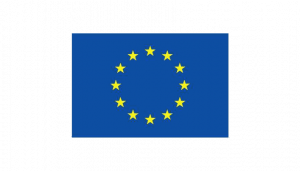 IMPLEMENTED BY
IMPLEMENTED BY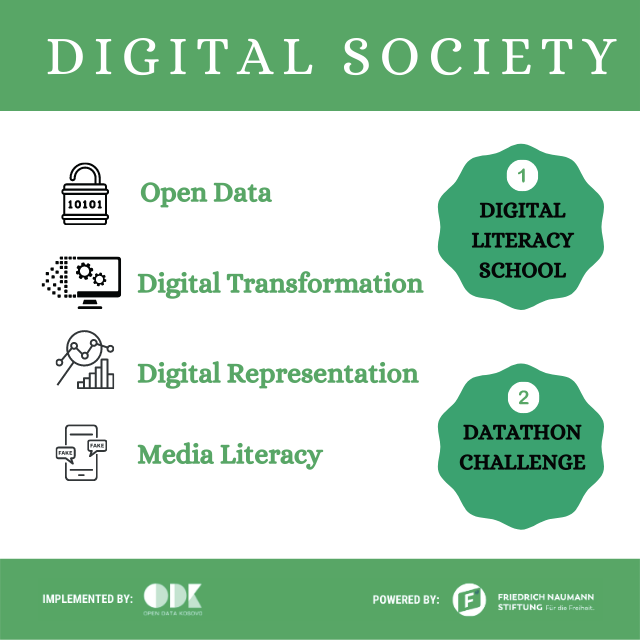
The aim of the Digital Society project was to promote the usage of digital technology, communication tools, and the internet in a creative and safe way in order to support their development, learning, and capacity to effectively participate in social and community life. This project was supported by the Friedrich Naumann Foundation for Freedom, and it carried out a variety of activities, including a Digital Literacy School activity that helped youth understand the digital world through the 5-day workshop as well as the Datathon challenge that brought together software developers, designers, journalists, etc. to solve a real-world issue using data science. A total of 19 applicants participated in the digital literacy school activity; Topics that were covered are Introduction to Open Data, Digital Transformation, Cybersecurity, Media Literacy (Fake News), and Digital Representation. As for the Datathon challenge, a total of 20 participants applied to be part of it, while during the entire duration of the Datathon there were 12 participants, from which different profiles were selected, most of them being students. The winning team from the Datathon competition has been granted the opportunity to attend the Smart City Festival organized by the Friedrich Naumann Foundation for Freedom. The project’s successful outcomes produced from the activities have been illustrated in two videos that were promoted to the public on various social media channels.